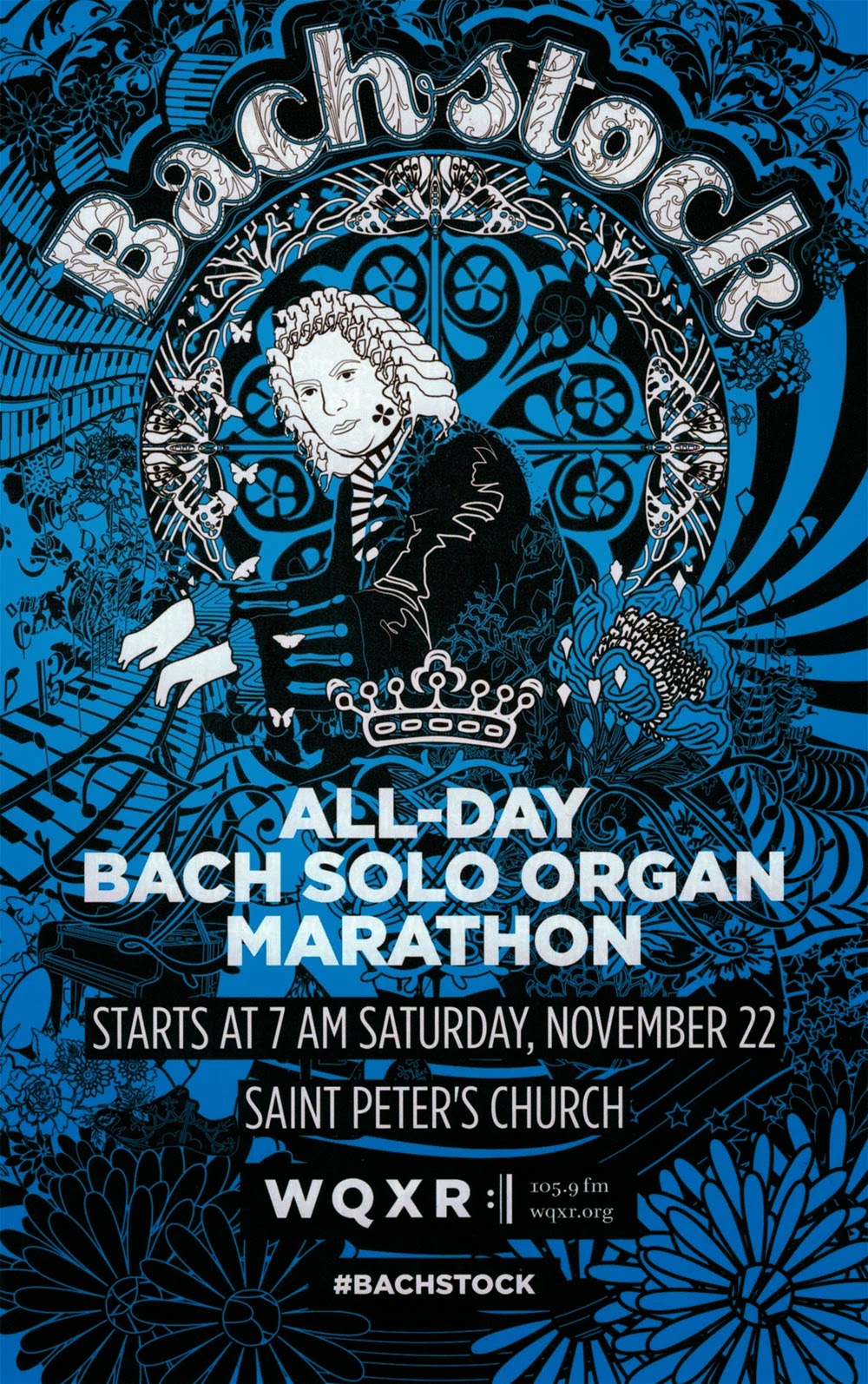Surprised the psychedelic vibe of Bachstock appealed to me? I am. The idea of naming a celebration of Bach's corpus of work–the apogee of spiritual, philosophical, and theoretical musical expression–after the deepest depths of sixties hippie-dom is not immediately attractive. The festival is more than its name, though, and there is little more rich than Bach, whose music WQXR has celebrated throughout November. Besides, and more charitably, I do like the idea of a season of Bach, of the music just filling the air for a time, and his music does in fact produce euphoria and despair, so you really could call it psychedelic.
The climax of the month-long festivities was Saturday's marathon of Bach's solo organ works at St. Peter's Church. From 7AM until midnight a troupe of organists consisting of Juilliard students and local organ directors led by organ virtuoso Paul Jacobs performed a nearly unbroken series of Bach's solo organ oeuvre. I managed to squeak into the 2:30 slot in which Benjamin Sheen, Assistant Organist at St. Thomas Church Fifth Avenue, performed on St. Peter's Klais organ. If other of the day's organists cherry-picked the famous pieces like the F Major Toccata and Fugue and the Fantasy and Fugue in C Minor, Sheen had the pleasure and Herculean task to play a lesser known masterpiece, Bach's Third Clavier Übung.
Sheen brought a vital clarity to the pieces, from the more fingery works like BWV.688 to the austere grandness of BWV.678. A projector trained on the keyboardists hands showed helpfully for the eyes what could not have escaped the ears: the blistering complexity of some of the fugues, double and triple and variously complex. The program changed Bach's ordering of the pieces for a more traditional variation among large and small scale, fast and slow, but this did not diminish the pleasure of hearing various figures come and go in different guises. The pairs, however, which Bach wrote on the same chorales, one setting with pedals and the other for manuals alone, were performed together, a contrast which shows not only the fecundity of Bach's musical mind, but the patience which sees all ideas worked out to their utmost.
The orchestration was especially pleasing and refreshing, casting new light on pieces to which we have become perhaps too accustomed by our favorite recordings. How exciting to hear a familiar piece anew, waves once deep and ruddy now bright and clear. What shone forth most though, was the variety. Influences French, Italian, and German permeate this "most-consequential compositional project for the organ from the years of [Bach's] maturity" [1] alongside the Bachian array of polyphonic artistry, themes of every shape and length, and sizes from the little duets BWV.802-805 to the Trinity of BWV.552a.
Even though I had stopped in for a mere 75 minutes of the marathon–for the absolute steal of $10 admission–I caught the fervor of what was really a one-day festival. Yes, I could have lived without the kitschier element, the "I got your Bach" t-shirts and puns on the radio, but there was a lot of merry, expert music-making. Too I found it a pleasure to see a festival with its namesake at the center, unlike that of a certain Salzburg-born composer. It may have only been one church and one radio station, but with queuing lines, people buzzing about, web streams, and Bach's glorious music contrapunting to the ends of the eternity, it felt like Bach was everywhere, if only for a little while, and that's a dear satisfaction in itself.
–
[1] Horn, Victora. "French Influence in Bach's Organ Works" in J.S. Bach as Organist. ed. Stauffer George and May, Ernest









No comments:
Post a Comment